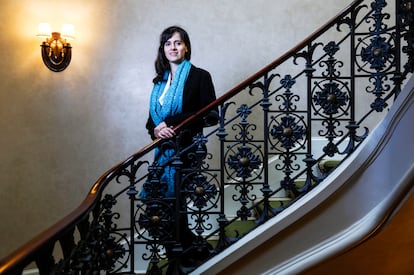Carissa Véliz, philosopher: ‘If you want to have a good party, ask your friends not to take photos’
The expert in ethics applied to technology advocates for a system of digital anonymity that protects us from companies. Its absence undermines our autonomy

Carissa Véliz is an expert in ethics applied to technology. The Spanish-Mexican philosopher, who does not provide a date or place of birth to protect her privacy, is one of the voices that warn us about the growing digital dangers that lurk at every corner and chip away at our individual autonomy. Her first book, Privacy is Power: Why and How You Should Take Back Control of Your Data, encourages developing strategies to not allow ourselves to be dominated by companies and technology. Simple things like using multiple emails to protect the one we really value, or providing companies with a pseudonym instead of our personal data. The essay was selected by The Economist as one of the books of 2020. Last January she published The Ethics of Privacy and Surveillance.
Véliz teaches at the Institute for Ethics in AI at the University of Oxford and she has also worked as a private advisor. The meeting takes place one morning in May in an office with plush sofas and a painting of a country landscape at the Rafael del Pino Foundation, next to Paseo del Prado in Madrid, where she has taught a course on Ethics of Artificial Intelligence. Véliz, who collaborates with various media outlets, including EL PAÍS, has a fresh, almost adolescent voice.
Question. You consider that surveillance capitalism makes an unacceptable intrusion into our privacy to the point of undermining our autonomy.
Answer. Autonomy is a fundamental principle. To have it, you need space to make your own decisions, to think about what your values are and act in that direction. And when they are watching you all the time, the other’s gaze is oppressive, it seeks your compliance. The simple fact of being observed reduces our impulse to experiment, to ask. Human beings need privacy, intimacy and a certain solitude to discover ourselves.
Q. How does this automate our thinking, as you maintain?
A. It affects how we experience things and how we express ourselves. I recently asked that a talk I was going to give not be recorded, we had not agreed to it. They said okay, they announced it to the public, and the camera was turned off. The conversation was lively, the audience participated a lot. At the end, the organizer told me: “It was the most interesting session we have had, there was a lot of interaction.” We don’t realize how surveillance influences us. If we turned off the cameras we would see that we do not think the same, we do not express things the same way, there is not the same type of frankness in the debate.
“Human beings need privacy and a certain solitude to discover ourselves”
Q. You defend a system of anonymity to protect our privacy. Can you explain it?
A. It is a system that works with pseudonyms. If we had not allowed the use of these we would not have the works of John Locke, Marx or Kierkegaard... Anonymity is one of the most important social innovations of democracy, in particular, the possibility of making an anonymous protest, going out into the streets... Today we carry our cell phones with us, which identifies us, and that sometimes means that people do not show up when they need to. I defend a system that protects us, as long as we do not commit a crime. The idea is to have a permanent pseudonym that you can use to interact online, but that protects your identity. The people who suffer the most on social media are women and we are pushing them out of the public sphere because we are not protecting them from abuse. Many no longer want to be on Twitter, in politics, or to be journalists. Having a public persona exposes you to tremendous abuse.
Q. We still have no user age verification system that protects minors.
A. A Zero-Knowledge Proof system is being trialled at the BBC. Imagine that a minor wants to watch a program for people over 18 years of age. Through this system, which provides a verified identity, the chain will know if the person is of legal age or not.
Q. In which parts of the planet has individual privacy already been lost?
A. China takes the lead, it has no pretensions to being democratic or liberal. It is going all out with surveillance, it intends for it to be centralized. The surveillance you are subjected to at work has consequences on your personal relationships in a country like this. It affects, for example, the visibility you achieve on dating applications.
“Anonymity is one of the most important social innovations of democracy, in particular, for protesting”
Q. According to my score, do I achieve more or less visibility in a dating application?
A. Yes. And visibility is decided by a centralized system of social credibility. The extent to which it works centrally is controversial and a work in progress, but that is the intention and the trend. If you do something wrong at work and your boss gives you a bad rating, that rating will affect you in many areas. That's part of what it means to have a totalitarian system: one aspect of your life influences everything else.
Q. In the West, to escape the lack of privacy, what do we have? Our individual rebellion?
A. Obviously, we need regulation. Collective problems need collective solutions. It is not up to the individual to change things and yet we have power; When we change our behavior, companies and governments are sensitive to it. It’s not about not using your cell phone. We must try to protect our privacy when we can and it is not too demanding. Instead of using WhatsApp, use Signal. It’s free, it works just as well, it doesn’t collect your data. Instead of using Gmail, use Proton Mail. Instead of using Google, use DuckDuckGo. And if you want to have a good party, ask your friends not to take photos and certainly not to share them.
Q. Confidence in the laws that should stop digital abuse is not at a high point.
A. We are at the beginning of the revolution. This is the Wild West and it is a civilizing process that we have experienced before. Cars in the 1960s did not have seat belts. It took decades.
Q. Ethically, what worries you most about artificial intelligence?
A. That five white men in Silicon Valley are designing it at any price.
Q. What types of decisions should we never leave in the hands of AI?
A. Any decision that can significantly affect a person’s life. AI is not a moral agent, it cannot be responsible for harming someone or denying them an important opportunity. Nor should we delegate to AI jobs in which we value the empathy of a fellow citizen who can understand what we feel.
Sign up for our weekly newsletter to get more English-language news coverage from EL PAÍS USA Edition











































